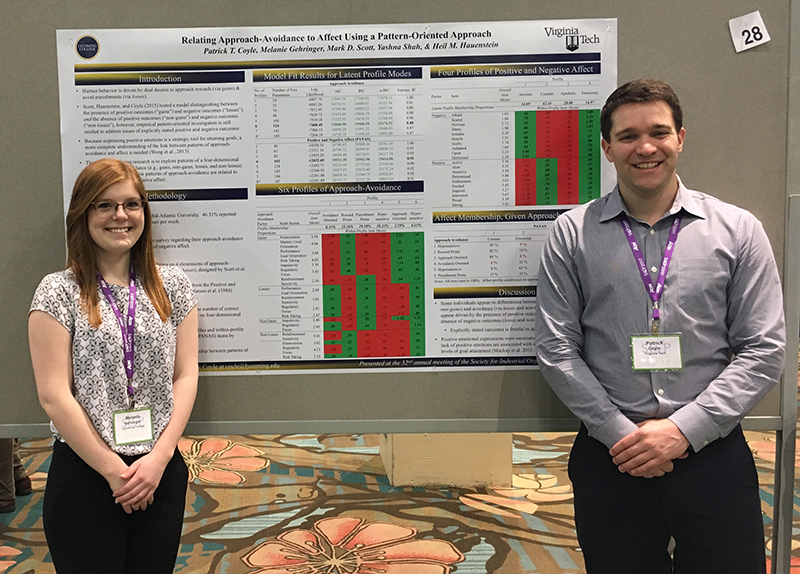
Melanie Gehringer and Patrick Coyle discuss their research findings at a meeting of the Society for Industrial and Occupational Psychology in Florida.
Download Image: Web
A student-faculty research duo at Lycoming College identified an interesting link between motivational orientation and emotions in the workplace. Motivational orientation refers to a person’s interests, attitudes and willingness to master tasks and goals.
Junior Melanie Gehringer, a business and psychology major from Cochranville, Pa., and Patrick Coyle, Ph.D., assistant professor in business administration, teamed up to research a new angle on this topic by examining subgroups of individuals with these variables. Their findings indicate that groups of people with particular motivational orientations feel emotions in specific ways.
“Our findings point to a clear relationship between motivations and the emotions people feel, which affect an individual’s performance and productivity,” said Gehringer. “The results can help managers learn better ways to encourage their employees.”
One of the more interesting findings they identified is that about 25 percent of people are difficult to motivate. They are not motivated by rewards or intrinsic factors like self-worth so their performance levels are often lower.
“These people can be the bane of a manager’s existence,” said Coyle. “But our research revealed that the majority of these individuals are also unlikely to experience negative emotions. That finding has large ramifications. These types of individuals are well-suited for tasks that others find stressful or negative, like telemarketing or sales jobs that feature frequent rejections. These people may be more likely to shrug off a negative outcome. With a little creativity when assigning tasks, managers can turn a low performing group into an asset.”
Gehringer supported Coyle with all phases of the research: developing the concept and arguments, organizing relevant literature on the topic, and writing up their results for industry peers.
Gehringer and Coyle presented their findings, titled “Relating Approach-Avoidance to Affect Using a Pattern-Oriented Approach,” during a meeting of the Society for Industrial and Occupational Psychology in Orlando, Fla. The international conference peer reviews all submissions and accepts, an average, only 25 percent of submissions for presentation.
“This prestigious conference heavily favors Ph.D. level graduate students and professionals, so presenting research as an undergraduate student is particularly impressive,” Coyle said.
“Conducting research with a faculty member helps students explore a range of options that they did not realize were possibilities,” he added. “They learn about graduate school options and professional research opportunities while building connections to fields outside their major. They also build confidence as they improve critical thinking and time management skills. The proven ability to see projects through to completion is valued by employers and gives our students a key competitive advantage when job-searching.”
The project was funded by a Student Research Grant and the Haberberger Endowed Student-Faculty Research Program at Lycoming College.